Crypto Exchange Safety Checker
Is This Exchange Safe?
Answer these 5 quick questions to determine if a crypto exchange is trustworthy or potentially risky.
Based on the CoinRui case study in the article.
Safety Assessment
Back in 2020, CoinRui looked like just another crypto exchange trying to get a piece of the pie. But by mid-2021, it was already falling apart. Today, in 2025, it’s gone. No website. No customer service. No way to log in. And worst of all - no way to get your money back if you had any there.
If you’re wondering whether CoinRui is still active, the answer is simple: it’s not. The platform vanished without warning. Users who deposited Bitcoin, Ethereum, or any other crypto found themselves locked out. Some lost everything. There were no official announcements. No email alerts. No bankruptcy filings you could track. Just silence.
What Happened to CoinRui?
CoinRui didn’t just shut down - it collapsed. The kind of collapse that leaves users scrambling. From what users reported back then, the trading interface started glitching. Orders wouldn’t go through. Deposits disappeared into thin air. Withdrawals took weeks, if they worked at all. Then, one day, the website wouldn’t load. Not even a 404 error. Just a blank screen or a connection timeout.
There’s no evidence CoinRui ever had real security measures in place. No cold storage audits. No multi-signature wallets. No transparent reserve proofs. That’s not an oversight - it’s a red flag you should’ve seen before signing up. Legitimate exchanges like Binance or Kraken publish regular proof-of-reserves reports. CoinRui? Nothing. Not even a blog post.
And customer support? Don’t bother looking. The live chat vanished. The support email bounced back. The Telegram group went quiet. No replies. No explanations. Just ghosts.
Why People Got Trapped
Many users joined CoinRui because it promised low fees and high leverage. Sounds great - until you realize the platform couldn’t even process a simple withdrawal. One user, who posted on a crypto forum in 2021, said they had $12,000 in ETH on CoinRui. They tried to cash out twice. Both times, the transaction failed. When they contacted support, they got an automated reply that didn’t match their account. A week later, the site went dark.
This isn’t rare. It’s a pattern. Small, unregulated exchanges often lure users with flashy promises - then disappear when they can’t cover withdrawals. They’re not trying to build a business. They’re running a pump-and-dump scheme disguised as a trading platform.
There’s no record of CoinRui being licensed anywhere - not in the U.S., not in the EU, not in Australia. That’s not a coincidence. Legit exchanges get licensed. They follow KYC rules. They report to regulators. CoinRui did none of that. And when the heat came, it vanished.
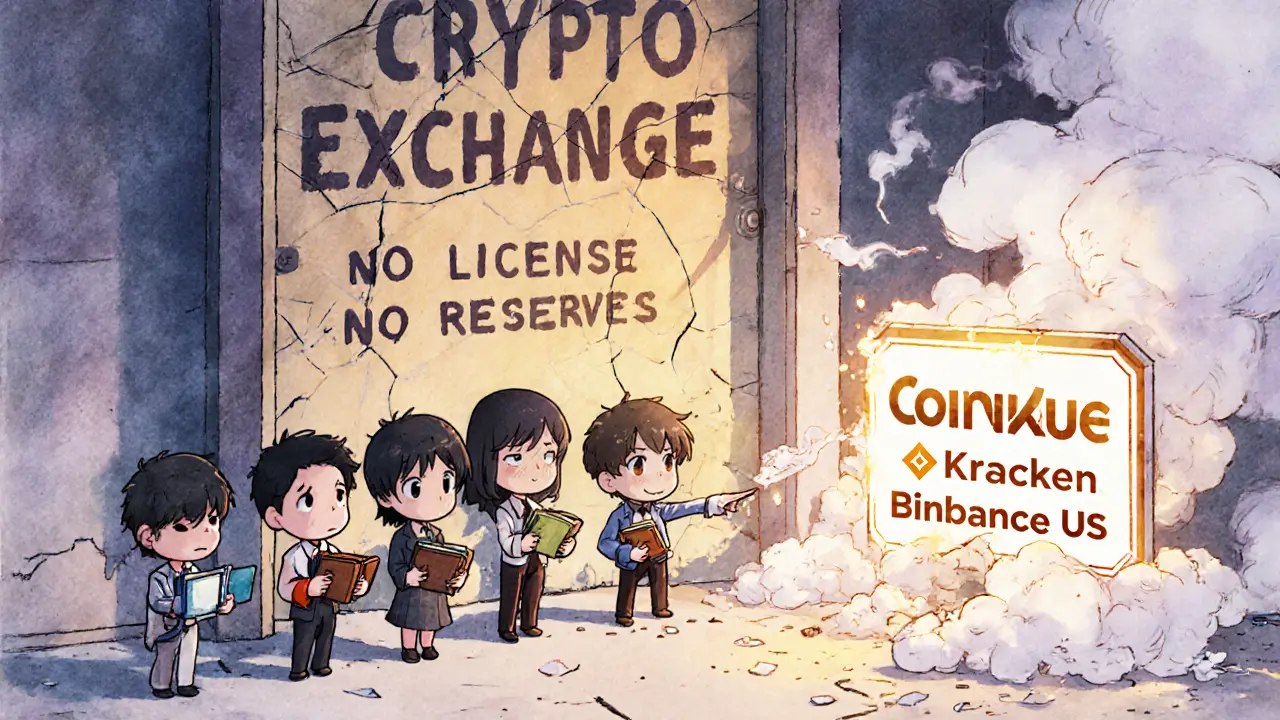
How It Compares to Real Exchanges in 2025
Today, the top crypto exchanges operate like businesses. They have teams. They have compliance officers. They have insurance funds. Here’s how CoinRui stacks up against platforms still running in 2025:
| Feature | CoinRui | Coinbase | Kraken | Binance US |
|---|---|---|---|---|
| Still Operational? | No | Yes | Yes | Yes |
| Cryptocurrencies Offered | Unknown (likely under 50) | 235+ | 350+ | 158+ |
| Trading Fees (Spot) | Unknown | 0%-3.99% | 0%-0.4% | 0%-0.6% |
| Withdrawal Reliability | None | Instant to 24h | Under 1 hour | Under 30 mins |
| Regulatory Compliance | None | U.S. licensed | U.S. and EU licensed | U.S. licensed |
| Insurance Fund | No | Yes (up to $250M) | Yes (up to $300M) | Yes (up to $100M) |
| Customer Support | Nonexistent | 24/7 live chat | 24/7 live chat | 24/7 live chat |
Notice the difference? The exchanges that survive have structure. They’re accountable. CoinRui had none of that. And now, it’s a footnote in crypto history - a warning sign.
What You Should Do If You Used CoinRui
If you still have funds on CoinRui - and you haven’t been able to access them - you’re not alone. But you’re also not out of options.
- Check your transaction history. Look for the last withdrawal you tried. Was it confirmed on the blockchain? If not, your coins are likely stuck on CoinRui’s internal ledger - which no longer exists.
- Search for any official announcements. Type “CoinRui shutdown” or “CoinRui scam” into Google. You’ll find forum posts from 2021 where users shared screenshots of the site going down. No new info since then.
- Report it to your local financial authority. In Australia, that’s ASIC. Even if they can’t recover your money, they’ll add CoinRui to their list of unlicensed platforms - helping others avoid it.
- Don’t pay anyone claiming they can “recover your CoinRui funds.” That’s a second scam. Real recovery services don’t ask for upfront fees or private keys.
Unfortunately, the odds of getting your money back are near zero. CoinRui didn’t have the infrastructure to protect users. It wasn’t designed to last. It was built to take money - and run.
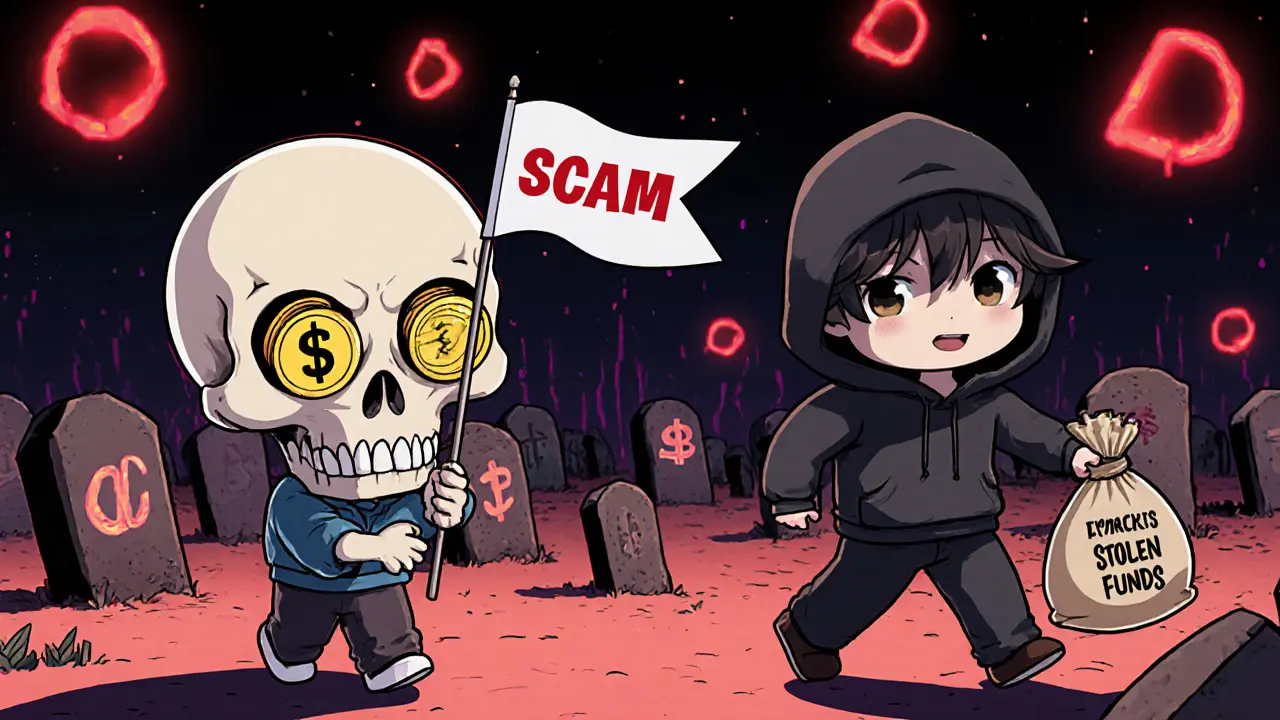
How to Avoid CoinRui-Type Exchanges
You can’t afford to make the same mistake twice. Here’s how to pick a crypto exchange that won’t vanish overnight:
- Check licensing - Does the exchange have a license from a known regulator like ASIC, FINCEN, or the FCA? If not, walk away.
- Look for proof of reserves - Legit exchanges publish reports showing they hold enough crypto to cover all user balances. CoinRui never did.
- Read user reviews on independent sites - Not the ones on the exchange’s own site. Check Trustpilot, Reddit, or CryptoCompare. Look for patterns: “Can’t withdraw,” “Support ignores me,” “Site went down.”
- Start small - If you’re testing a new exchange, deposit a tiny amount first. See if you can withdraw it. If you can’t, you know it’s risky.
- Use hardware wallets - Never leave large amounts on any exchange. Move your crypto to a wallet you control. Even Coinbase can be hacked. But your own Ledger or Trezor? That’s yours.
There are hundreds of crypto exchanges out there. You don’t need to gamble on the ones that vanish. Stick with the ones that have been around for years, have real teams, and answer to regulators.
Final Warning
CoinRui isn’t just another failed startup. It’s a reminder that in crypto, if it sounds too good to be true - and there’s no name behind it - it probably is. No one checks the background of a tiny exchange because they assume it’s just another niche player. But in crypto, the smallest platforms are often the most dangerous.
Don’t let FOMO push you into unregulated platforms. Don’t trust promises of high returns with no transparency. And never, ever leave your life savings on an exchange that doesn’t answer your emails.
CoinRui is gone. Don’t let your money be next.
Is CoinRui still operating in 2025?
No, CoinRui is not operating in 2025. The platform became inaccessible in mid-2021, with its website going offline and customer support disappearing. There has been no revival, no official statement, and no way for users to access their funds since then.
Can I recover my funds from CoinRui?
The chances of recovering funds from CoinRui are extremely low. The exchange had no insurance, no legal structure for asset recovery, and no public bankruptcy process. If your coins are still on the platform, they’re likely lost. Avoid any service that claims to recover CoinRui funds - these are scams.
Was CoinRui a scam?
While there’s no legal ruling calling CoinRui a scam, its behavior matches classic scam patterns: no transparency, no regulatory compliance, sudden shutdown, and users losing access to funds. It operated without licensing and vanished without warning - hallmarks of a fraudulent exchange.
What should I look for in a safe crypto exchange?
Look for exchanges that are licensed by regulators (like ASIC, FINCEN, or the FCA), publish proof of reserves, offer 24/7 customer support, and have a long track record. Top choices in 2025 include Coinbase, Kraken, and Binance US. Always test withdrawals with a small amount first.
Why did CoinRui fail when bigger exchanges succeeded?
CoinRui failed because it skipped the basics: compliance, security, and transparency. Bigger exchanges invest in audits, legal teams, and insurance. CoinRui didn’t. It relied on hype and low fees to attract users - then collapsed when it couldn’t handle withdrawals. The crypto market rewards reliability, not shortcuts.
Should I avoid all small crypto exchanges?
Not all small exchanges are dangerous, but most unregulated ones are. If an exchange has no public licensing, no clear team, no support channels, and no history - treat it as high-risk. Stick with platforms that have been around for at least 3-5 years and have verifiable compliance records.

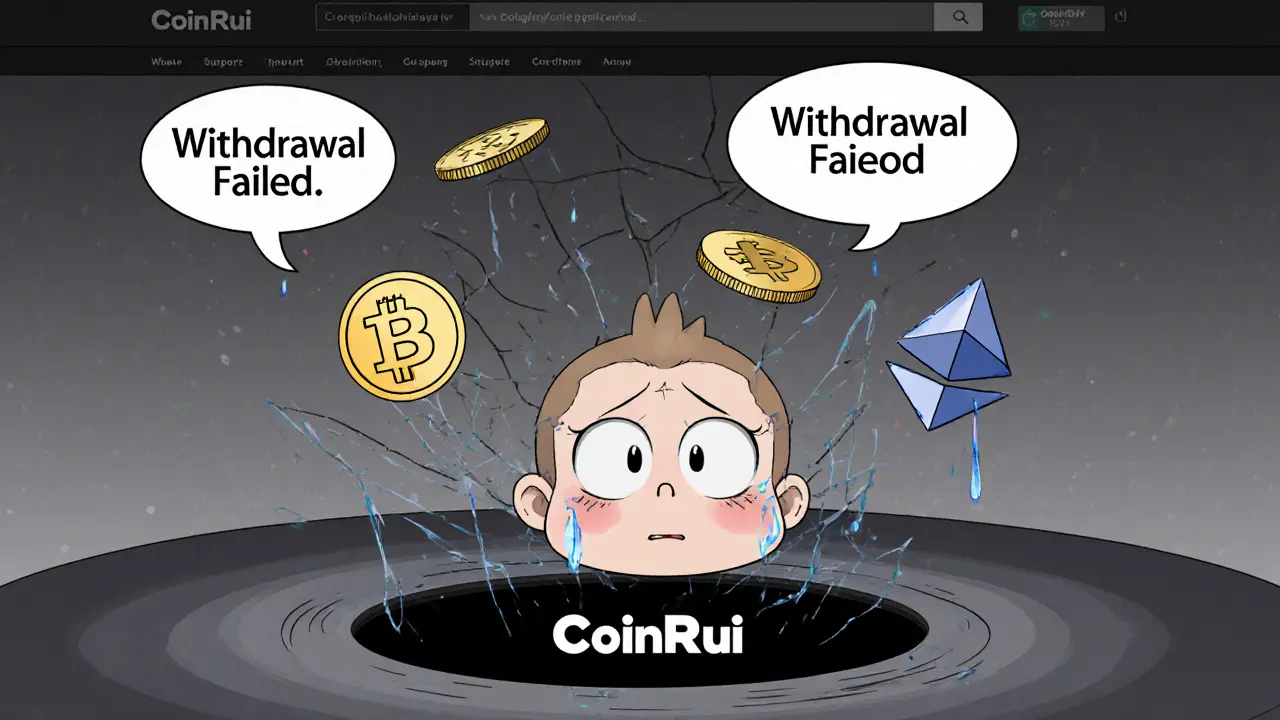

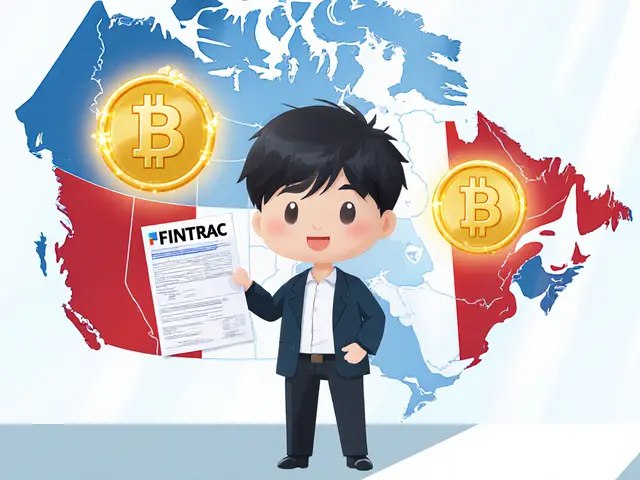

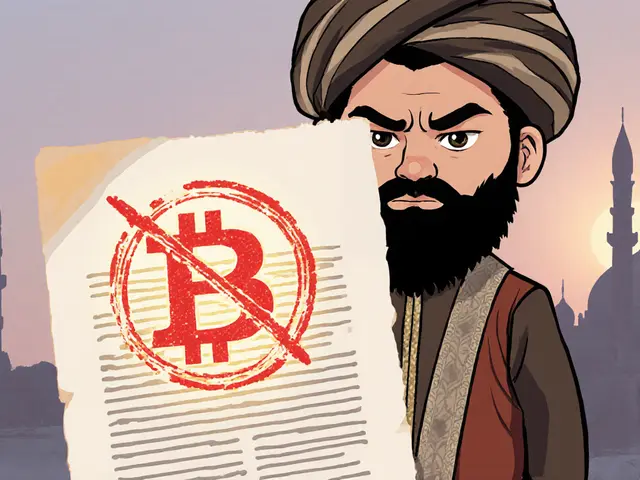

bob marley
November 1, 2025 AT 19:00Of course it vanished. Anyone who used CoinRui deserved to lose everything. You didn’t check licensing? You didn’t verify reserves? You just saw ‘high leverage’ and jumped in like a lemming. Crypto isn’t a casino you play with your eyes closed. You got played. Again.
And now you’re here crying? Grow up. The market doesn’t care about your FOMO. It cares about due diligence. And you didn’t do any.
Next time, maybe read a blog before handing over your keys. Or better yet - don’t use exchanges at all. Just HODL in a wallet. Simple.
Also, stop posting about this. It’s been 4 years. Move on.
Jeremy Jaramillo
November 2, 2025 AT 05:09I know how devastating this feels. I lost my entire portfolio to a similar exchange back in 2019. It’s not just about the money - it’s the betrayal. You trusted a platform with your life savings, and it just… disappeared.
The worst part? You’re not alone. Thousands went through this. But here’s what I learned: the pain doesn’t vanish, but the lesson does. Use this to protect others. Share this post. Warn your friends. Help someone avoid the same trap.
And if you’re still holding out hope for a refund - please, don’t pay anyone who says they can recover it. That’s the second wave of the scam. You’ve already been through enough.
Sammy Krigs
November 2, 2025 AT 23:04so like… coinrui was a rug pull? i mean i heard somethign about it but i thought it was just a server crash or something. like i didnt even know they had no licencing. i just saw the low fees and was like ‘hey this looks good’… oops. my bad. my bad.
anyway i lost like 8k in btc. no way to get it back. i guess i just got scammed. but seriously why do these guys even exist? who lets them run a site like that?
also why does no one ever get jailed for this? its like theft but with blockchain. why is it so hard to catch these people?
rip my portfolio. i’m going to stick to coinbase from now on. no more sketchy shit.
naveen kumar
November 4, 2025 AT 10:45Let me guess - CoinRui was a front for the Fed. You think they let an unlicensed exchange operate for a year? Please. That’s not incompetence. That’s intentional. They let it grow, collected user data, drained the wallets, then vanished. All to justify tighter control over crypto. The real scam isn’t CoinRui - it’s the regulatory system that lets this happen and then pretends to protect you.
And now they’re pushing ‘licensed exchanges’ like Coinbase? Those are just the new banks with better UIs. They track you, report you, freeze you. CoinRui stole your coins. The government steals your freedom.
Either way - you lose. Welcome to crypto, where the only real asset is paranoia.
Bruce Bynum
November 5, 2025 AT 22:54Don’t beat yourself up. You’re not the only one. But you’re smart enough to read this and learn - that’s what matters.
Start small. Use trusted platforms. Always test withdrawals. Keep your coins off exchanges when you can.
And hey - if you lost money, that’s a painful lesson. But now you know. That’s power. Use it to protect the next person who’s just getting started.
You got this. Crypto’s still worth it - just not the shady stuff.
Wesley Grimm
November 7, 2025 AT 04:24The author is being overly generous. CoinRui wasn’t a ‘failed startup.’ It was a criminal enterprise. No ‘glitches.’ No ‘unexpected shutdown.’ It was a planned exit. They collected deposits, manipulated order books to trigger liquidations, then pulled the plug. The timing? Coincided with a Bitcoin rally. Classic.
And the fact that no one’s been prosecuted? That’s the real story. The DOJ has the IP logs. They have the wallet addresses. They have the server data. But they don’t care. Because the victims are ‘sophisticated investors’ - code for ‘not politically useful.’
This isn’t a cautionary tale. It’s a cover-up.
Masechaba Setona
November 8, 2025 AT 16:42Wow. So you’re saying the only safe crypto exchange is one that’s regulated? 😏
Let me ask you this - who regulates the regulators? Who audits the auditors? Who’s to say Coinbase isn’t just the *legal* version of CoinRui? They have the same backend infrastructure. The same data collection. The same cold storage that’s probably just a hot wallet with a fancy label.
And insurance funds? Please. That’s just a PR stunt. Who pays out when the government freezes assets? Who pays out when the exchange gets hacked *by* the government?
Real safety? Not holding it on any exchange. Not trusting anyone. Not even the ones with ‘24/7 support.’
TL;DR: You’re not safer with Coinbase. You’re just more comfortable. And comfort is the first step to getting owned.
Kymberley Sant
November 9, 2025 AT 21:58ok so i just found out coinrui was a scam and i feel so dumb. i mean i had like 5k in there and i just thought ‘oh its got a nice website’ and i never checked the fine print. my bad. my bad.
but honestly i think its kinda funny how people act like they’re so smart now. like ‘i told you so’ vibes. bro i’m just trying to learn.
anyway i’m going to start with binance now. fingers crossed i don’t get rug pulled again. 🤞
Edgerton Trowbridge
November 11, 2025 AT 12:11It is imperative to emphasize that the collapse of CoinRui represents a systemic failure of oversight in the decentralized finance ecosystem. The absence of regulatory compliance, coupled with the lack of transparent reserve verification, constitutes a breach of fiduciary duty toward retail participants. While the emotional impact on affected users is undeniable, the structural response must be institutional: advocacy for mandatory KYC/AML protocols, public disclosure of proof-of-reserves, and the establishment of international arbitration mechanisms for digital asset recovery.
Furthermore, the proliferation of unregulated platforms underscores a critical gap in financial literacy education. Educational institutions, industry associations, and governmental agencies must collaborate to implement mandatory pre-investment curricula for retail crypto participants.
Let this not be a cautionary tale of individual negligence, but a catalyst for systemic reform.
Matthew Affrunti
November 12, 2025 AT 21:19Been there. Lost money. Felt awful.
But here’s the good part - you’re here now. You’re learning. That’s the win.
Next time, start with $10. Withdraw it. Do it again. If it works, you’re good. If not? Walk away.
And never, ever keep more than you’re okay with losing on an exchange.
You’ll be okay. Crypto’s still awesome. Just… be smart about it.
mark Hayes
November 13, 2025 AT 11:42rip coinrui 🤡
so yeah i lost my btc there too… i thought it was just slow withdrawals at first. then one day the site was just gone. no warning. no email. nothing.
now i only use coinbase and keep 90% in my ledger. i’m not rich but i sleep better.
also if you’re still holding out hope for a refund… don’t. i saw a guy on youtube who paid $500 to ‘recover’ his funds. he got a pdf with a link to a google drive. 😅
stay safe out there fam 💪
Derek Hardman
November 13, 2025 AT 19:05While the emotional weight of financial loss is considerable, it is equally important to contextualize this incident within the broader evolution of digital asset markets. The emergence of unregulated exchanges during the 2020–2021 speculative boom was predictable, given the absence of standardized governance frameworks. CoinRui’s collapse, while tragic for individual users, has served as a catalyst for increased regulatory scrutiny across jurisdictions.
It is noteworthy that the platforms that have endured - Coinbase, Kraken, Binance US - have done so by embracing compliance, transparency, and operational integrity. Their continued existence is not merely a function of market share, but of institutional credibility.
For future participants, the lesson is clear: prioritize regulatory alignment over yield optimization. The cost of negligence is not merely financial - it is reputational, psychological, and, in some cases, irreversible.
Eliane Karp Toledo
November 15, 2025 AT 07:08What if CoinRui was never real? What if it was a honeypot created by the NSA to map out crypto users? Think about it - no website, no logs, no trace. Just a ghost. And now all the people who used it? They’re on a list. Every wallet they touched. Every IP. Every device.
They didn’t steal your crypto. They stole your identity.
And now you’re sitting here, talking about ‘lost funds’ like it’s a financial issue. No. It’s surveillance. It’s control. The exchange was never meant to last. It was meant to collect. And now you’re the data point.
Next time you think about using a new exchange… ask yourself - who’s behind it? And who’s watching?
Phyllis Nordquist
November 15, 2025 AT 13:39The structural vulnerabilities exposed by CoinRui’s collapse underscore a critical imperative for the digital asset ecosystem: the non-negotiable requirement for institutional-grade security architecture and regulatory accountability. Retail investors must be empowered through standardized, third-party verification protocols - including on-chain reserve audits, multi-sig wallet structures, and regulatory licensing disclosures - as mandatory prerequisites for platform operation.
Furthermore, the absence of a centralized recovery mechanism for compromised assets necessitates the development of decentralized insurance pools, governed by smart contracts and funded by protocol-level fees. This is not a call for increased centralization, but for the institutionalization of trustless safeguards.
Until such frameworks are universally adopted, the risk profile of any unregulated exchange remains existential. CoinRui was not an anomaly. It was a symptom. The cure is systemic, not anecdotal.